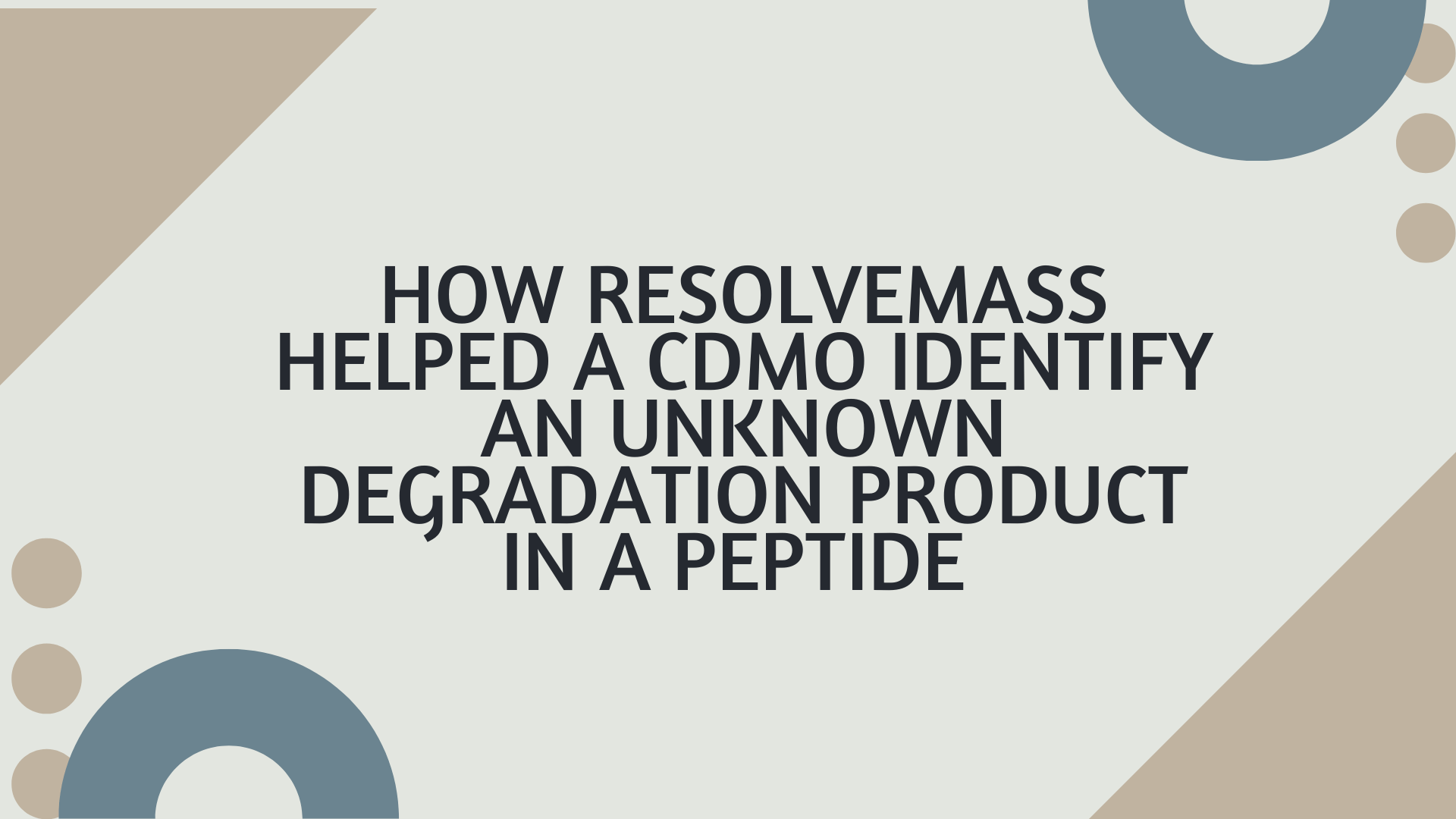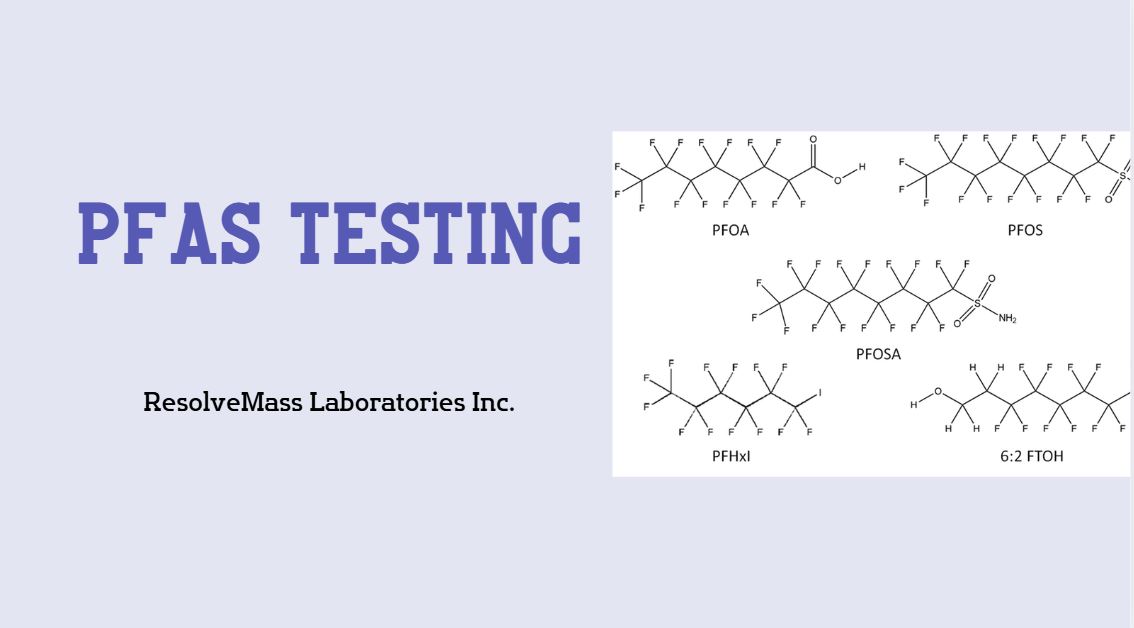In the field of biopharmaceuticals, understanding and solving degradation issues in peptides is a critical step in ensuring drug safety and smooth regulatory approval. When a major CDMO (Contract Development and Manufacturing Organization) discovered an unknown impurity during stability testing of a peptide API, they turned to ResolveMass Laboratories. Through expert Peptide Degradation Product Characterization, ResolveMass helped them identify the impurity and stay on track with their IND submission.
🧩 The Challenge: Unknown Impurity in a Clinical Peptide
The CDMO was working on a peptide-based treatment for cancer. During stress testing, a small impurity kept appearing and increasing over time. This raised concerns about how safe the drug was, how it would be approved by regulatory agencies, and whether their IND submission would be delayed. Their in-house team didn’t have the tools or bandwidth to solve the problem. They needed advanced support from a team that specialized in Peptide Degradation Product Characterization.
🔬 How ResolveMass Approached the Problem
ResolveMass Laboratories followed a step-by-step process using modern and advanced testing techniques to identify the degradation issue in the peptide. Their approach combined high-resolution instrumentation with deep scientific insight.
High-Resolution Mass Spectrometry (HR-MS)
ResolveMass used Orbitrap and QToF platforms to get highly accurate molecular weight data. These systems are excellent at detecting even very small changes in a peptide’s structure. This made it possible to determine what elements the unknown impurity was made of and how it differed from the original peptide. This was a critical first step in identifying the degradation pathway.
LC-MS/MS Peptide Mapping
The team performed enzymatic digestion followed by LC-MS/MS analysis to map the peptide’s structure. By comparing the intact peptide with the degraded sample, they identified the exact points of chemical modification. This mapping technique is essential for locating where structural breakdown occurs, especially in complex peptide chains.
NMR Spectroscopy
Once the impurity was isolated, Nuclear Magnetic Resonance (NMR) was used to study its structure in detail. NMR helped detect subtle chemical shifts and provided clear insights into how the side chains and bonds were altered. This method added another layer of confirmation to the earlier mass spectrometry results, solidifying the identity of the degradation product.
Forced Degradation Studies
ResolveMass carried out controlled stress testing under different conditions like heat, oxidation, acidic, and basic environments. These forced degradation studies helped recreate the impurity in the lab, proving how and when it forms. The results supported the overall degradation pathway and provided useful information for improving peptide formulation and storage.
Explore our capabilities in detail on Peptide Characterization Techniques and FDA Requirements for Peptide Characterization.
🧪 Key Findings: What the Impurity Really Was
The testing revealed that the unknown impurity came from a process called deamidation, where a glutamine in the peptide changed under oxidative stress. Other issues included:
- A small break at the end (C-terminus) of the peptide
- A change in its isoelectric point (pI), which can affect how the peptide dissolves
- Repeating the stress studies showed the same impurity, confirming how it formed
Thanks to these findings, the CDMO was able to change the storage conditions and improve the product’s stability.
Read more on Peptide Impurities Characterization.
📄 Regulatory Benefits: Keeping IND Submission on Track
With a complete and well-documented report from ResolveMass, the CDMO updated their IND (Investigational New Drug) submission with confidence. The results:
- Met FDA requirements without needing extra data
- Showed strong scientific work and transparency
- Avoided delays and stayed on their development timeline
ResolveMass’s detailed Peptide Degradation Product Characterization helped make the IND process smoother and more successful.
ResolveMass provided a fully documented characterization report with spectral evidence and regulatory-ready justifications aligned with Peptide Characterization for IND and NDA guidelines.
🔍 Why Characterizing Peptide Degradation Products Matters
Peptides are sensitive to light, temperature, and chemical changes. They can break down through oxidation, hydrolysis, or other changes. Understanding how this happens is important for:
- Meeting FDA and global regulatory guidelines
- Creating stable drug formulations
- Predicting shelf life and ensuring patient safety
ResolveMass offers deep expertise and complete testing services to support these critical needs.
ResolveMass’s Peptide Characterization in Drug Development services are tailored to deliver clarity across all development phases.
💼 Why Choose ResolveMass for Peptide Analysis
ResolveMass is a trusted partner for peptide testing, thanks to:
- Over 15 years of experience in peptide and protein analysis
- A team of PhD scientists with deep industry knowledge
- Labs that follow strict GMP (Good Manufacturing Practices)
- A clear understanding of FDA and global regulations
Their focus on quality and speed helps drug developers avoid problems and stay compliant.
More about our services:
Peptide Characterization Service in Canada
Peptide Characterization Techniques and Applications
Peptide Characterization Service in Canada – Part 2
✅ Conclusion: Quality Testing That Saves Time and Risk
ResolveMass Laboratories showed how detailed, science-based work can solve even tough problems like unknown impurities. Their fast and accurate Peptide Degradation Product Characterization helped the CDMO avoid costly delays and regulatory issues.
If your drug program is facing peptide degradation issues, ResolveMass is ready to help with expert testing, clear results, and full regulatory support.
👉 Contact Us Today to learn how we can support your next IND or NDA.
📨 Reach Our Scientists for a project discussion.
📞 Schedule a Consultation with our peptide analytics team.
FAQs
Peptides are characterized using various techniques like High-Performance Liquid Chromatography (HPLC) to check purity, Mass Spectrometry (MS) to determine molecular weight, and Nuclear Magnetic Resonance (NMR) for structure analysis. Other tools like UV spectroscopy and amino acid analysis are also used to confirm identity and quality.
Peptides can degrade within days or weeks depending on their sequence, storage conditions, and exposure to light, heat, or moisture. Some peptides are more stable, while others break down quickly if not stored properly, especially in solution form.
Yes, many peptides start to degrade at room temperature, especially in liquid form. Factors like heat, moisture, and oxygen can speed up degradation. That’s why peptides are usually stored in cool, dry conditions, often refrigerated or frozen.
Common types of peptide degradation include hydrolysis (breaking of bonds by water), oxidation (reaction with oxygen), and deamidation (loss of amide groups). These changes can affect the peptide’s function, stability, and safety.
Formulating peptides is challenging because they are sensitive to heat, pH, light, and enzymes. They can easily degrade, stick to surfaces, or lose activity. Choosing the right stabilizers and storage conditions is key to keeping them stable and effective.
Peptides are mainly broken down by enzymes called proteases or peptidases. These include trypsin, chymotrypsin, and carboxypeptidase, which cut peptide bonds at specific sites. Such enzymatic activity can lead to unwanted degradation during drug development or in the body.
ResolveMass Laboratories Inc. is a leading provider of peptide degradation product characterization services, with specialized infrastructure and regulatory-grade documentation.
Contact Us Now


